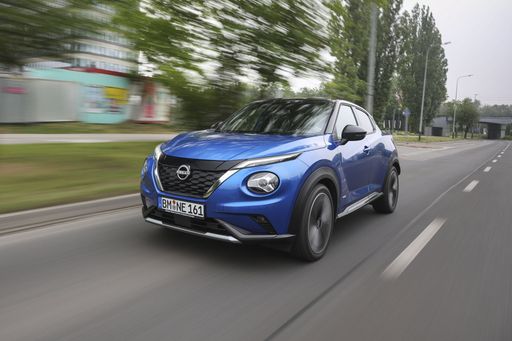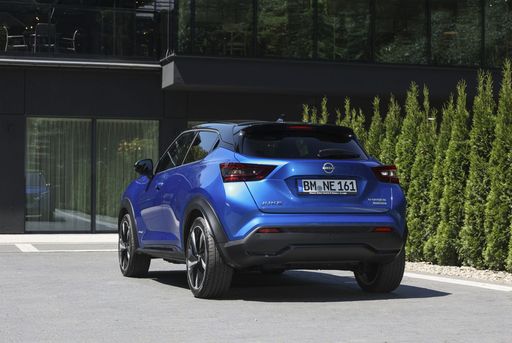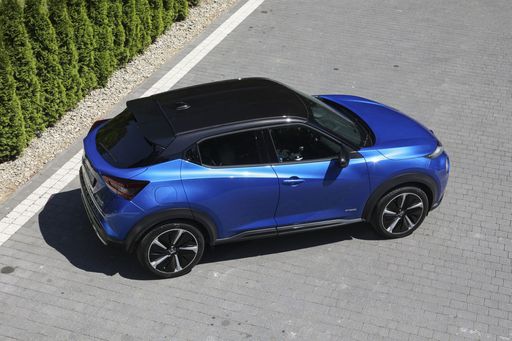Nissan Juke vs Toyota Prius - Differences and prices compared
Compare performance (143 HP vs 223 HP), boot space and price (21400 £ vs 39400 £ ) at a glance. Find out which car is the better choice for you – Nissan Juke or Toyota Prius?
Costs and Efficiency:
Price and efficiency are key factors when choosing a car – and this is often where the real differences emerge.
Nissan Juke has a decisively advantage in terms of price – it starts at 21400 £ , while the Toyota Prius costs 39400 £ . That’s a price difference of around 18035 £.
Fuel consumption also shows a difference: Toyota Prius manages with 0.50 L and is therefore convincingly more efficient than the Nissan Juke with 4.70 L. The difference is about 4.20 L per 100 km.
Engine and Performance:
Power, torque and acceleration say a lot about how a car feels on the road. This is where you see which model delivers more driving dynamics.
When it comes to engine power, the Toyota Prius has a distinct edge – offering 223 HP compared to 143 HP. That’s roughly 80 HP more horsepower.
In acceleration from 0 to 100 km/h, the Toyota Prius is clearly quicker – completing the sprint in 6.80 s, while the Nissan Juke takes 10.10 s. That’s about 3.30 s faster.
In terms of top speed, the Nissan Juke performs barely noticeable better – reaching 180 km/h, while the Toyota Prius tops out at 177 km/h. The difference is around 3 km/h.
Space and Everyday Use:
Whether family car or daily driver – which one offers more room, flexibility and comfort?
Both vehicles offer seating for 5 people.
In curb weight, Nissan Juke is distinct lighter – 1274 kg compared to 1620 kg. The difference is around 346 kg.
In terms of boot space, the Nissan Juke offers clearly perceptible more room – 422 L compared to 284 L. That’s a difference of about 138 L.
When it comes to payload, Nissan Juke somewhat takes the win – 427 kg compared to 375 kg. That’s a difference of about 52 kg.
Who wins the race?
The Toyota Prius proves to be leaves the rival little chance and therefore becomes our DriveDuel Champion!
Toyota Prius is the better all-rounder in this comparison.

Toyota Prius
Costs and Consumption
View detailed analysis
Engine and Performance
View detailed analysis
Dimensions and Body
View detailed analysis
Nissan Juke
The Nissan Juke is a pocket-sized crossover that refuses to blend in, with quirky styling and a cheeky stance that turns heads at every traffic light. It’s ideal for shoppers who value personality and nimble urban driving over maximum practicality, delivering surprising pep and a well-equipped feel for everyday fun.
details



Toyota Prius
The Prius glides through traffic like a wise commuter's secret weapon, balancing miserly running costs with an unflappable sense of reliability. It's not a thrill seeker, but its roomy cabin, sensible packaging and low-stress driving personality make it a brilliant choice for buyers who value peace of mind over pulse-raising performance.
details



Costs and Consumption |
|
|---|---|
|
Price
21400 - 30100 £
|
Price
39400 - 45800 £
|
|
Consumption L/100km
4.7 - 6 L
|
Consumption L/100km
0.5 - 0.7 L
|
|
Consumption kWh/100km
-
|
Consumption kWh/100km
-
|
|
Electric Range
-
|
Electric Range
72 - 86 km
|
|
Battery Capacity
0.60 kWh
|
Battery Capacity
-
|
|
co2
107 - 136 g/km
|
co2
12 - 17 g/km
|
|
Fuel tank capacity
46 L
|
Fuel tank capacity
40 L
|
Dimensions and Body |
|
|---|---|
|
Body Type
SUV
|
Body Type
Hatchback
|
|
Seats
5
|
Seats
5
|
|
Doors
5
|
Doors
5
|
|
Curb weight
1274 - 1405 kg
|
Curb weight
1620 - 1630 kg
|
|
Trunk capacity
354 - 422 L
|
Trunk capacity
284 L
|
|
Length
4210 mm
|
Length
4599 mm
|
|
Width
1800 mm
|
Width
1782 mm
|
|
Height
1593 mm
|
Height
1470 mm
|
|
Max trunk capacity
1237 - 1305 L
|
Max trunk capacity
-
|
|
Payload
405 - 427 kg
|
Payload
365 - 375 kg
|
Engine and Performance |
|
|---|---|
|
Engine Type
Petrol, Full Hybrid
|
Engine Type
Plugin Hybrid
|
|
Transmission
Manuel, Automatic
|
Transmission
Automatic
|
|
Transmission Detail
Manual Gearbox, Dual-Clutch Automatic, Automatic Gearbox
|
Transmission Detail
CVT
|
|
Drive Type
Front-Wheel Drive
|
Drive Type
Front-Wheel Drive
|
|
Power HP
114 - 143 HP
|
Power HP
223 HP
|
|
Acceleration 0-100km/h
10.1 - 11.8 s
|
Acceleration 0-100km/h
6.80 s
|
|
Max Speed
166 - 180 km/h
|
Max Speed
177 km/h
|
|
Torque
200 Nm
|
Torque
-
|
|
Number of Cylinders
3 - 4
|
Number of Cylinders
4
|
|
Power kW
84 - 105 kW
|
Power kW
164 kW
|
|
Engine capacity
999 - 1598 cm3
|
Engine capacity
1998 cm3
|
General |
|
|---|---|
|
Model Year
2024
|
Model Year
2023
|
|
CO2 Efficiency Class
D, E, C
|
CO2 Efficiency Class
B
|
|
Brand
Nissan
|
Brand
Toyota
|
What drive types are available for the Nissan Juke?
Available configurations include Front-Wheel Drive.




